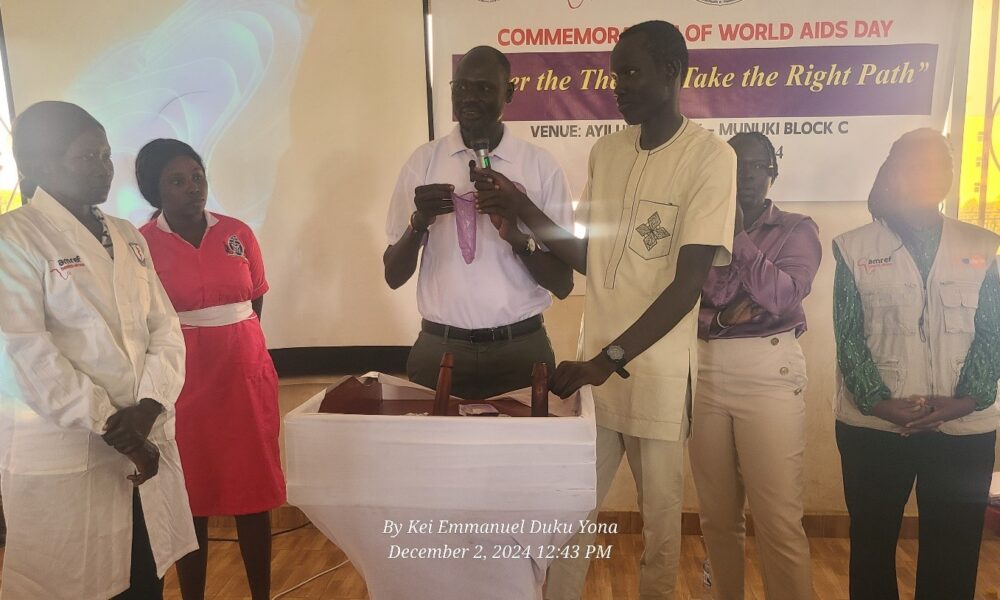By Kei Emmanuel Duku
HIV/ADIS prevalence rates high among commercial female sex workers in Yambio in Western Equatoria State and Wau, in Western Bahr el Ghazal, National Ministry of Health reveals in a latest report released on Monday.
HIV/AIDS Prevention Officer at Ministry of Health, Deng Dominic reveal during public lecture at Ayii University in Juba that Yambio is leading in HIV/AIDS prevalence with 13.6% while Wau follows with 6.75% in the country.
The Public lecture was organized ahead of official commemoration of World AIDS Day scheduled to take place on Tuesday,
Dominic attributed the high prevalence rate in Yambio to its prom with the Central African Republic and the Democratic Republic of Congo, lack of awareness, and high number of women involved in commercial sex.
He says the closeness of Wau and its open border to Lakes, Northern, and Western Bahr El Ghazal fuel the prevalence rates in Wau town.
“These two places housed a lot of internally displaced persons and refugees, and as they became vulnerable due to crises, they were forced into sexual activities, meeting different men whom they don’t know their health status, and in the process, one end up contracting the virus,” explained Dominic.
However, he noted that there is currently an ongoing study to assess the positivity and prevalence rate level in Nimule town on the border with Uganda, Lake States, and the Country’s Capital, Juba.
Dominic added the current biting economic crisis in the country is one of the driving factors for the increase in cases of HIV/ADIS prevalence rates across major cities in the country forcing some women to do commercial sex activities to earn a living.
He said currently, the government is engaged in carrying awareness on preventive measures for the safe use of condoms, family planning, voluntary counselling and testing, early detection, and putting HIV-positive patients on Antiviral Therapy (ARV).
Meanwhile, Anna Modong, Amref Health Africa’s reproductive Health Specialist, stated that in 2022, the global contraceptive prevalence rate was 65% for various contraceptive methods such as the use of condoms, locational Amenorrhea Method (LAM).
Meanwhile the contraceptive prevalence rate for modern types, such as the use of emergency pills, implants, and injectables was at 58%.
At the regional level, in 2022, South Sudan has a 29.7% prevalence rate of access to contraceptives compared to Kenya and Uganda at 14% and 11%, respectively.
She further added that about 60% of the population in Uganda and Kenya are eligible to access contraceptive services compared to South Sudan, at only 6% as of 2022.
He urged the government and other actors in the health sector, particularly the private sector, to commit to the national policy under the Open Family 2030 agenda, which focuses on creating access to contraceptives, improving health services, and securing funding for family planning programs.
“If this policy is materialized, it means people who are HIV/AIDS positive will benefit from this because it talks about improving increasing funding for the health sector from 2% to 12%, of which 4% will only be deducted to family planning,” said Modong.
Modong further argues for women at the grassroots level to have access to contraceptive services and other HIV/AIDS programs, both private health facilities and government hospitals, Primary Healthcare centers and Units, as well as community-based facilities, should be equipped with modern types of contraceptives, to increase the contraceptive prevalence and reduce the disease burden.
Dr. Idyoro Ojukwu, Obstetrician/Gynecological and Associate Professor at Juba University stated that all pregnant women who test positive for HIV/AIDS should be initiated on antiviral medication this is to prevent Mother-Child Transmission and keep monitoring the infected mother’s viral load.
She also advised pregnant women to regularly attend antennal care services so that they can receive health educational messages on family planning and other nutritional programs that will help them deliver the unborn babies safely.
“By offering exclusive breastfeeding, better family planning methods, and a respectful maternity package that combines medical care, emotional support, and societal understanding, HIV-positive women can experience a healthier pregnancy and childbirth while minimizing the risk of HIV transmission to their newborns” concluded Dr. Ojukwu



